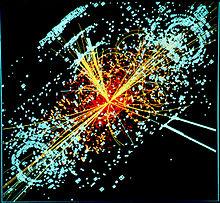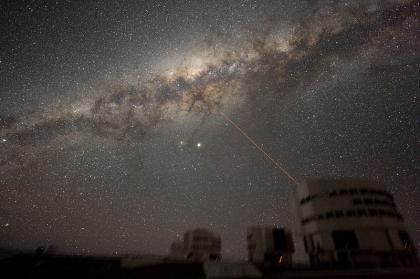How to Talk About Science and Space
When someone suggested a post about space and science at the Secret Kaplan Blog Meeting, everyone around the table looked at me. I love space stuff, and weird science, and I like it when I'm in a pub and I meet someone else who likes to talk about these things. But I noticed that it was difficult for non-native English speakers to talk about some science and space topics, because there's quite a lot of special vocab to learn.
If you like talking about these topics too, here are a few words and phrases to help you learn how to talk about science and space in English.
Science Words
Here are a few things you might talk about while enjoying a pint with a fellow physics fan:
Atom - An individual element, like Hydrogen or Oxygen. Atoms join together to form more complicated chemicals.
Molecule - A group of atoms connected by electrical charge to form a chemical
Subatomic Particles - very tiny pieces of atoms that are easier to describe than to see. These include protons, neutrons and electrons, which are made up of quarks, leptons, mesons and bosons.
The Standard Model - Today's "best theory" for how everything in the universe fits together. Includes Einstein's Relativity, but struggles with Quantum Physics
Einstein's Relativity - Theories by Albert Einstein about things like how gravity works, why the speed of light is the fastest anything can go, and how black holes might work. Relativity describes how very big things interact - anything we can see, from footballs to planets.
Quantum Physics - Ideas about how things work when they are far too small to see. Strangely, the smaller things are, the less they behave like things we can see.
Genetic Engineering - Changing something's genes (the "code" that makes a plant or animal the way it is) to make it stronger, healthier, or to protect it against disease. The abbreviation GMO means "genetically modified organism", and usually refers to really big potatoes and things like that.
Large Hadron Collider - A huge science lab in Switzerland and France. It is built around a huge tunnel that lets scientists speed atoms up to almost the speed of light and crash them into each other to see what comes out
The Higgs Boson - What scientists at the LHC were trying to find, and did find late in 2012. It is a subatomic particle that makes matter weigh something

Space Words
Now that you know some science vocabulary, these words will help you talk about space and space exploration:
Astronomy: The study of space. Don't confuse it with "Astrology", which is the study of how constellations can predict our future.
Orbit: When something in space spins around something bigger. The moon orbits the Earth.
Space Shuttle: The retired space planes that NASA used for 30 years to send men and equipment into space
SpaceX: A company that is developing new ways of sending material into space without needing people on board
International Space Station: An orbiting station built by American, European, Asian and Russian space agencies
Curiosity Rover: A robot sent to Mars to learn about whether there could have once been life on the "red planet"
Voyager I: A small, unmanned space ship launched in the 1970s that is now leaving the solar system
Black Hole: A collapsed star that has so much gravity, not even light can escape (so it appears completely black)
Asteroid: A piece of rock floating through space. Some companies are making plans to mine them for platinum and ice for water.
Meteor: A piece of rock that hits the earth
Meteorite: A piece of a piece of rock that hits the earth, and makes it all the way to the ground without burning up
How to Talk About Space and Science in English
If you find yourself at the pub, and someone wants to talk about these topics, here are a few tips:
- Find out if they have read any of the same books. If you've both read Steven Hawking's A Brief History of Time, then you can talk about the ideas in the book, even if you both read different translations.
- If you don't understand something, ask the other person to explain the idea slowly. You might have a word for it in your own language, but just not know it in English.
